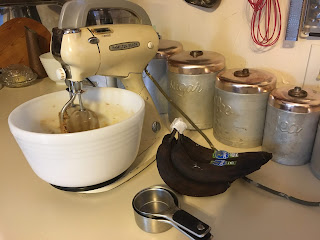 |
| Evert Hjalmer Nelson, my dad, at left with his mother Signe in 1959 as she was about to set sail for a visit home from the U.S. to her native Sweden. |
We were prepping for a March 3 public presentation in Portland Ovations' Seeking Resonance Series -- Toward Being Future Beings, a preview of an ongoing commissioned work with Yu'pik creator Emily Johnson.
I was honored to be in the room.
We were talking about home. About our connections to place and people and ancestors. About culture and what we create from these connections.
Jason Brown, a self-professed "hyper creative" of Maine's Penobscot Nation, was among us. Jason began talking about how he was teased in school for being a "half breed" because his father was Swedish and his mother Penobscot.
As importantly, he was talking about how he knew nothing about the Swedish side of his family. They had sailed for America and left it all behind them: the language, the culture, the stories, the families along with the land.
I might be 100% French-Canadian in my genes, but my adopted family was second gen from Bohemia on my mother's side and first gen Swedish on my father's side. Similarly to the Swedish side of Jason's family, our people had left their old lives and seemingly their old selves behind with little trace when they immigrated to the States.
It's a lot to leave behind: those gifts of belonging to place and culture and the people who came before.
And as a result, White America tends to be a very disconnected culture. And in our disconnections, we have done a lot of damage -- especially to the land, but also to each other.
I was lucky growing up. Signe did keep returning for visits to Sweden. She spoke Swedish with the Swedish community in New Britain, CT, and made us Swedish foods for the holidays. Sometimes Swedish cousins would appear in CT on vacation. And when I was 13 she took me to Sweden with her for a month.
This all sounds like a lot and it was definitely something. But my dad never once went to Sweden. None of the rest of my family ever did. He did not speak the language, and as my grandmother aged we saw less and less of the Swedish cousins. I never connected with them as adults and their names and addresses are lost to me. My connections to the people who came before me are not strong, and I've noticed that is baked into White American culture. Our people were leaving behind where they came from, and when they arrived here, in order to benefit from the privileges of joining "White America," they conscientiously erased their differences.
Looking back, I see the moment when I was a teenager and became aware of this. In the 1970's, Puerto Rican immigration to New Britain boomed and new arrivals quadrupled the existing population. My father -- who no longer lived in the industrial city in central CT in which he was born -- began complaining about them. He was predominantly angry that they insisted on speaking Spanish, and often cited Signe's experience -- of arriving in the U.S. and attending night school to learn English.
Like many white western European immigrants, Signe valued assimilation. The new Puerto Rican population valued sustaining their native cultures: they brought their home with them to the mainland U.S.
We all leave things behind. Yet the history of native genocide, enslavement of Africans, and domination resulting from white immigration is a tragic result of our displacement from our own native cultures, places, and peoples. We're disconnected. We've forgotten our "we" to fiercely hold onto our "I's." In so doing, much of value has been lost to us forever -- including the humility that arises when one gives credit to those who came before.








